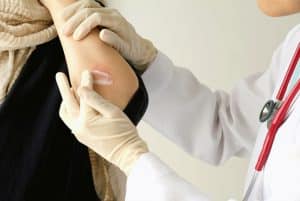Best Time to See An Allergy Doctor

What Are Allergy Doctors?
Allergy doctors (allergists) diagnose and treat allergies. There are different types of allergy doctors. If you have a skin allergy, a dermatologist is the best type of allergy doctor to see. If your allergies are related to hay fever, sinus problems, or asthma, then the best type of doctor to see is an ear, nose and throat (ENT) board certified otolaryngologist who specializes in the treatment of sinus problems and allergies.
How Do You Pick an Allergy Doctor?
If you or your primary care physician (PCP) have decided you’d benefit from visiting an allergy doctor, your PCP can provide you with referrals to allergy specialists in your area.
What Do Allergy Doctors Treat?
Allergists treat several different types of allergy problems, including:
Hay Fever (Allergic Rhinitis)
Hay fever involves allergic reactions that take place in the nose. Allergic rhinitis is typically triggered by pollens or molds. When symptoms occur during warmer weather, it's called hay fever. If the allergic reactions happen throughout the year, the allergens at home (things causing allergic reactions) could be dust mites, animal dander, or indoor molds, or there are allergens where you work or go to school.
Asthma
Asthma symptoms happen when airway muscle spasms block the airflow to the lungs. These symptoms can also develop when the lungs’ bronchial tubes become inflamed, and excess mucus can block airways. Inflammation and excess mucus can be triggered by allergens.
Signs You Need an Allergy Doctor
If you have any of the following symptoms that last more than three months or make it hard for you to sleep, work or attend school, it’s important to consult with an allergy doctor.
Hay Fever
- Sneezing
- Congestion
- Runny nose
- Itchy nose, eyes/roof of the mouth
Asthma Attack
- Difficulty breathing
- Tight feeling in the chest
- Coughing
- Wheezing
- Chronic cough (which is sometimes the only symptom)
What Types of Allergy Tests May an Allergist Perform?
Your allergy doctor will find the allergens by conducting tests. There are three commonly used allergy testing methods. Two are skin tests and a third test is called RAST testing.
Skin Prick Test
A small prick of the skin is made, and then the doctor puts an allergen on the open skin and watches for reactions. The skin pricks are typically placed on your arm or back. If you're allergic to a substance, you skin will react with symptoms of redness, itching, and swelling.
Intradermal Testing
Your allergy doctor injects a tiny amount of an allergen under the surface of your skin, and then waits to see if there is a reaction at the site.
RAST Testing
A blood test for detecting allergen antibodies.
Lakeside Allergy ENT has three board-certified otolaryngologists and allergy doctors specializing in diagnosing and treating all ear, nose, and throat-related (ENT) disorders, including allergies and asthma. If you or your child have asthma or allergy symptoms and you want to learn more about allergy testing and treatment, call our office at 972-771-5443 or request an appointment with our expert allergists.






